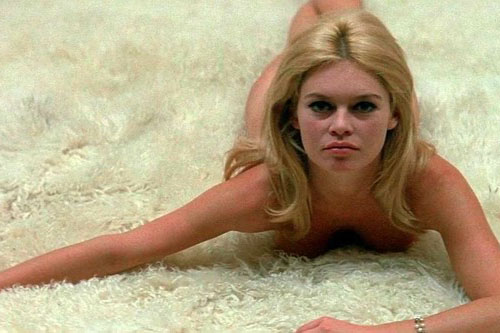F 1963, R: Jean-Luc Godard mit Brigitte Bardot, Jack Palance, Michel Piccoli, 103 Min, OmeU
Paul Javal soll das Drehbuch eines ins Stocken geratenen Filmprojekts überarbeiten. Nach einem ersten Treffen lädt der Produzent den Autor und dessen attraktive Ehefrau Camille in seine Villa ein. Weil Paul nichts gegen die Annährungsversuche des Produzenten unternimmt, glaubt Camille, ihr Mann würde sie für seine Karriere sogar „verkaufen“.
Ihre Liebe schlägt in Verachtung um. Jean-Luc Godard setzt sich in seiner Verfilmung des Romans von Alberto Moravia mit dem Konflikt zwischen Kommerzkino und künstlerischer Unabhängigkeit auseinander. Und gelangte während der eigenen Dreharbeiten selbst in einen Zwiespalt: Erstmals arbeitete er mit einem hohen Budget und einem großen Star wie Brigitte Bardot. „Godard nutzt eine schier unendliche Bandbreite an Referenzen, darunter Zitate und Anspielungen, die von Fritz Lang über Roberto Rossellini bis hin zu Joseph L. Mankiewicz ein unüberschaubares Netz spannen, das auf einer Meta-Ebene das europäische Kino und Hollywood in Kontext zueinander setzt.“ (moviepilot.de) „eine(r) der größten Filmklassiker über den persönlichen Zwiespalt zwischen Kunst und Kommerz sowie die fatalen Folgen, die dieser Konflikt auf eine brüchige Liebesbeziehung hat.“ (moviepilot.de)
ENGL
Contempt is the first of many Godard films about the making of a film, both a vicious obituary for Hollywood cinema and a melancholy portrait of the end of a marriage. Michel Piccoli plays a scriptwriter hired by vulgar, stentorian American producer Jack Palance to turn Homer's Odyssey into a sexy costume spectacle to be directed by Fritz Lang (playing himself, brilliantly and movingly).
Piccoli's bored wife Brigitte Bardot, feeling abandoned and prostituted by her husband, drifts into a wary affair with Palance; their flight to Rome, the Eternal City, ends in tragedy. Among Contempt's many inexhaustible splendours is Godard's use of colour: a Mondrian boogie-woogie of bold reds and blues across the blanched field of an unfinished apartment is central to the film's formal design. (source: tiff.net) "One of the masterworks of modern cinema" (Phillip Lopate, The New York Times). “Godard produced one of his most exquisite and approachable movies, finally graduating to colour (using his genius cinematographer Raoul Coutard) as though he were to the Technicolor manner born, and using the same red-versus-blue colour scheme he’d admired in Otto Preminger’s Mediterranean-set, Cahiers-beloved Bonjour Tristesse.” (theguardian.com)
Trailer:
